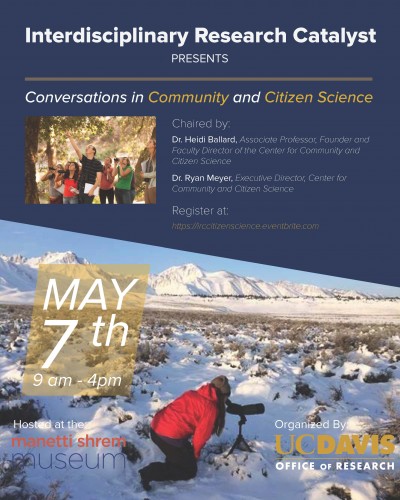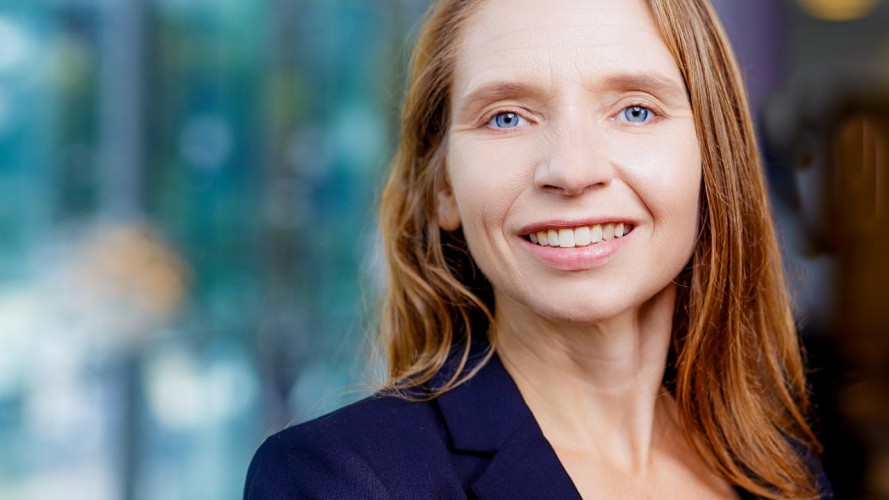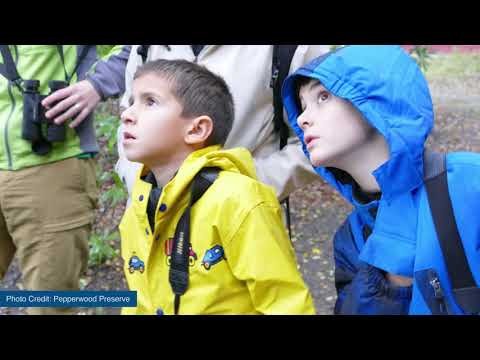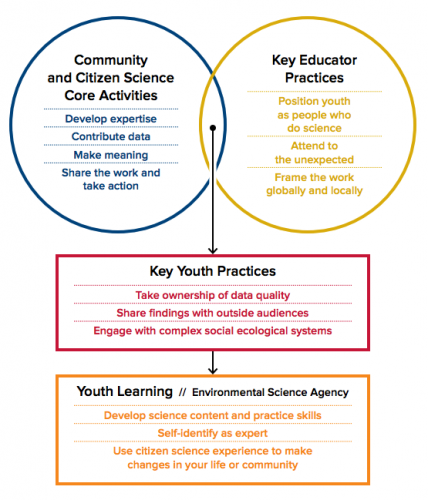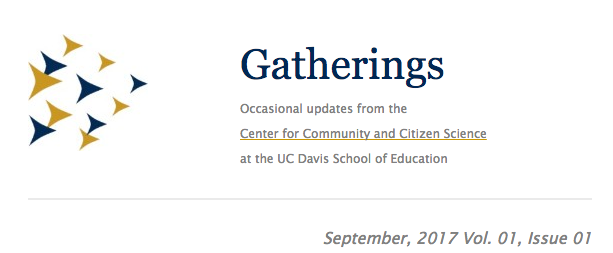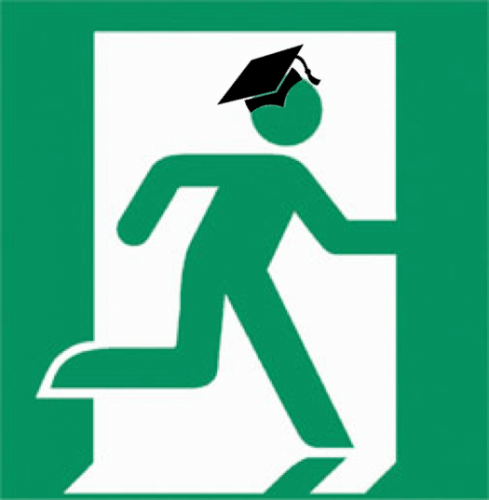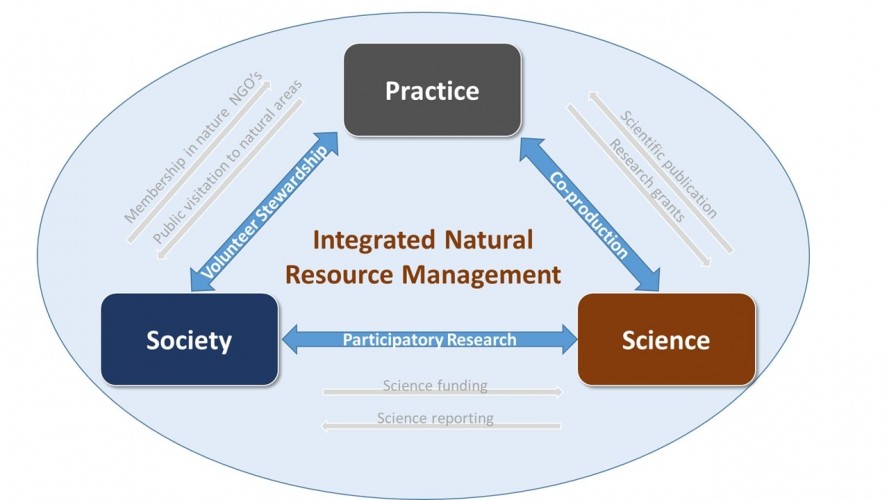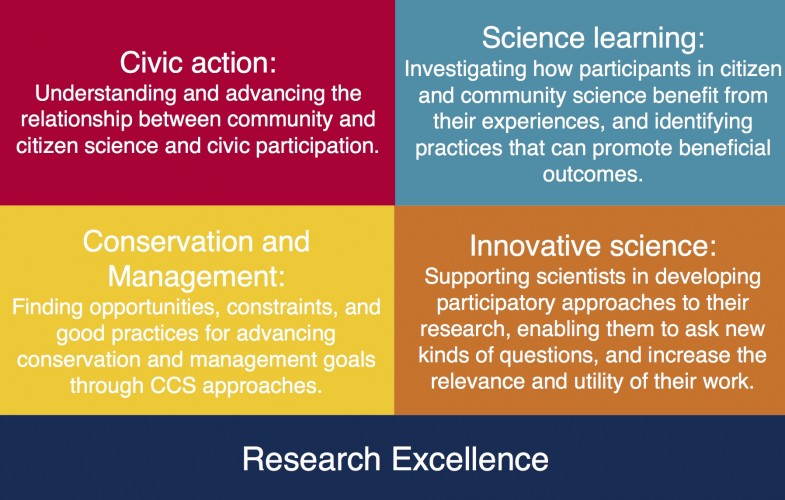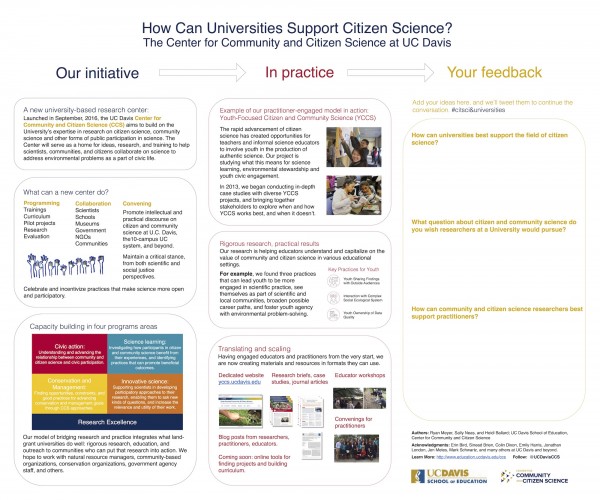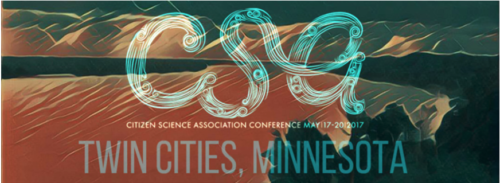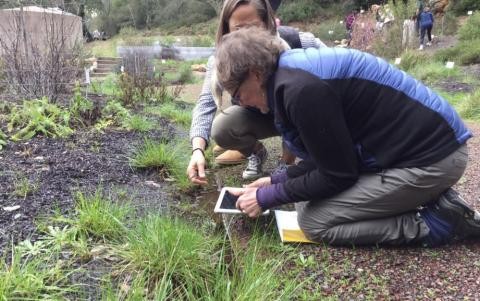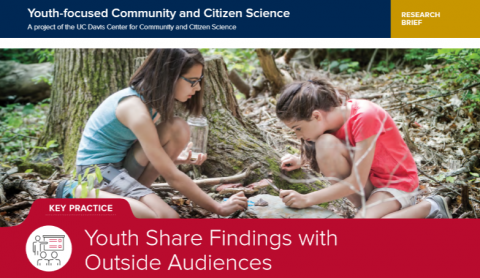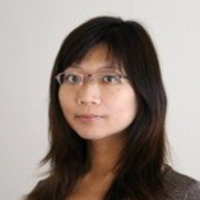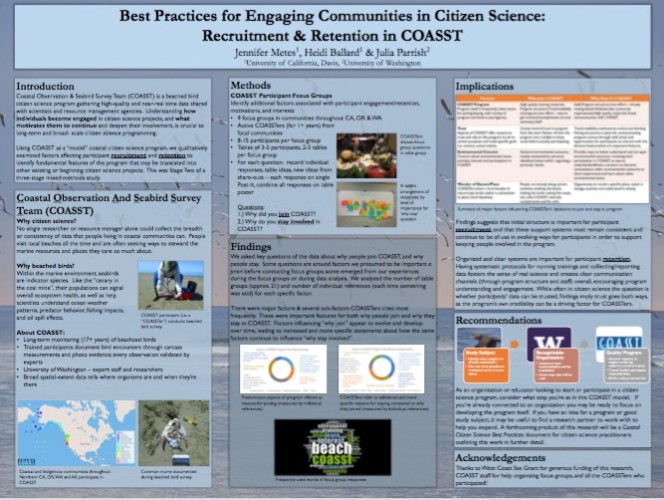Center for Community & Citizen Science Blog
Remodeling Science:
An Opportunity for UC Davis
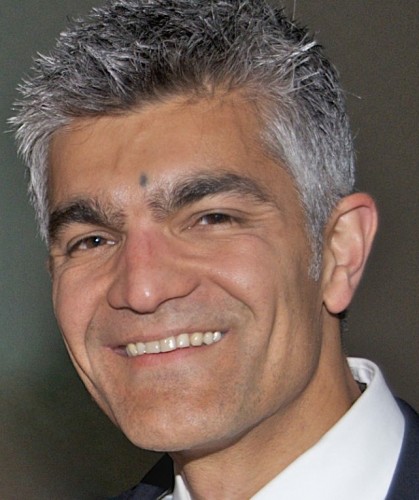 Rajul (Raj) Pandya, is the
founding director of the American Geophysical Union’s Thriving
Earth Exchange (TEX). On Monday, May 7th, at the Shrem
Museum, Pandya will deliver a keynote address to kick off a day
of learning, discussion, and networking activities with faculty
members, researchers, and other partners, sponsored by the
UC Davis Office of Research.
Rajul (Raj) Pandya, is the
founding director of the American Geophysical Union’s Thriving
Earth Exchange (TEX). On Monday, May 7th, at the Shrem
Museum, Pandya will deliver a keynote address to kick off a day
of learning, discussion, and networking activities with faculty
members, researchers, and other partners, sponsored by the
UC Davis Office of Research.
New Paper: A Framework for Teachers to Design and Facilitate Citizen Science Activities
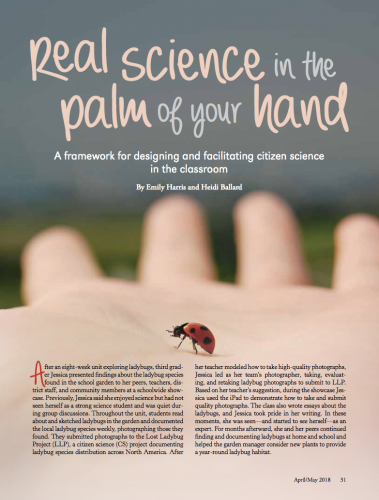 A new paper by
recently graduated Emily Harris and the Center’s Faculty
Director, Heidi Ballard, provides a framework for educators to
design and implement citizen science projects in the classroom to
facilitate meaningful student learning. This publication adds an
important component to our suite of materials aimed at
helping educators use Youth-focused Community and Citizen Science
in their work.
A new paper by
recently graduated Emily Harris and the Center’s Faculty
Director, Heidi Ballard, provides a framework for educators to
design and implement citizen science projects in the classroom to
facilitate meaningful student learning. This publication adds an
important component to our suite of materials aimed at
helping educators use Youth-focused Community and Citizen Science
in their work.
May 7 at the Shrem Museum
Interdisciplinary Research Catalyst: Conversations in Community and Citizen Science
UPDATE: The full agenda is now available. RSVP now to reserve a spot!
Gwen Ottinger visits for 2 events on April 4
We are pleased to be hosting Gwen Ottinger at the School of Education on April 3rd & 4th. Ottinger is an Associate Professor in the Department of Politics and the Center for Science, Technology, and Society at Drexel University, where she directs the Fair Tech Collective, a research group dedicated to using social science theory and methods to inform the development of technology that fosters environmental justice.
Youth-focused Community and Citizen Science
This blog post, authored by Ryan Meyer, Heidi Ballard, and Lila Higgins, originally appeared on the Blue Sky Funders Forum blog.
When do experiences with science lead young people to create change in their lives, landscapes, and communities? Consider this reflection from Rachel Anne Arias, a 12-year-old living in La Crescenta in Southern California:
What works in YCCS?
We asked our partners – expert researchers and practitioners — what it looks like when youth participate in community and citizen science. The resulting video speaks to the tremendous potential of youth-focused community and citizen science (YCCS) in the classroom, in the field, in a science museum, or anywhere in between.
New Book: Citizen Science for Coastal and Marine Conservation
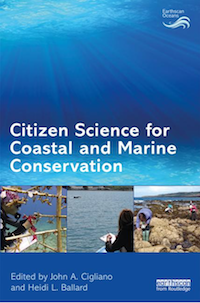 Co-edited by Dr. John Cigliano and
our Faculty Director, Heidi Ballard, this new volume provides a
broad range of case studies exploring the utility and
feasibility, as well as limitations, of using marine and coastal
citizen science for conservation to leverage these resources and
address these tensions.
Co-edited by Dr. John Cigliano and
our Faculty Director, Heidi Ballard, this new volume provides a
broad range of case studies exploring the utility and
feasibility, as well as limitations, of using marine and coastal
citizen science for conservation to leverage these resources and
address these tensions.
New Paper: Investigating Soil Knowledge in Uganda
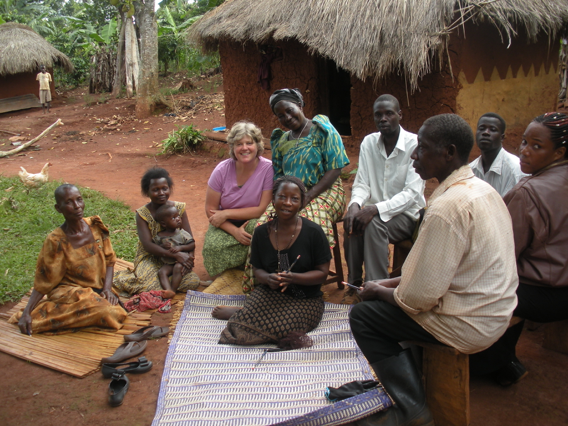 Center researchers collaborated with
colleagues on a
new paper that points to the importance of engaging directly
with existing knowledge when attempting to bring new knowledge
and practices into farming communities. Working in Uganda, the
researchers examined similarities and differences between
smallholder farmers’ knowledge about soil health and scientific
concepts. In cases of dissimilarity, they find that new concepts
are unlikely to be assimilated without concerted effort and they
recommend hands-on experimentation with novel practices as a
means of building confidence with improved soil management
practices. Our Faculty Director, Heidi Ballard, and former
student researcher, Emily Harris, collaborated with UC Davis
colleagues Lauren Pincus (Plant Sciences), and Kate Scow (Land,
Air and Water Resources) on this research.
Center researchers collaborated with
colleagues on a
new paper that points to the importance of engaging directly
with existing knowledge when attempting to bring new knowledge
and practices into farming communities. Working in Uganda, the
researchers examined similarities and differences between
smallholder farmers’ knowledge about soil health and scientific
concepts. In cases of dissimilarity, they find that new concepts
are unlikely to be assimilated without concerted effort and they
recommend hands-on experimentation with novel practices as a
means of building confidence with improved soil management
practices. Our Faculty Director, Heidi Ballard, and former
student researcher, Emily Harris, collaborated with UC Davis
colleagues Lauren Pincus (Plant Sciences), and Kate Scow (Land,
Air and Water Resources) on this research.
Join us this weekend at CSTA!
Why a Center?
What can universities bring to citizen and community science? What can citizen and community science bring to universities?
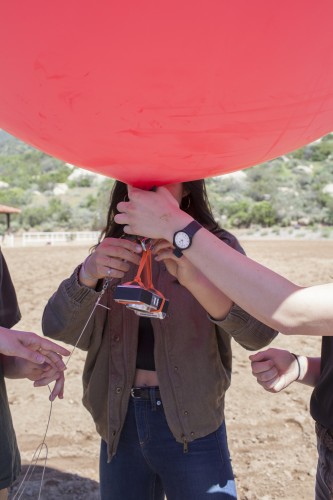 We have been talking to
colleagues all over the world about this double-sided question.
As the field of citizen and community science continues its
astounding growth, we believe there will be a continual need for
reflection, research-based insights, and a space to nurture
exciting new ideas about how individuals and communities can make
participation in science a part of their lives. And how we can
make interaction with diverse publics a regular practice of
science.
We have been talking to
colleagues all over the world about this double-sided question.
As the field of citizen and community science continues its
astounding growth, we believe there will be a continual need for
reflection, research-based insights, and a space to nurture
exciting new ideas about how individuals and communities can make
participation in science a part of their lives. And how we can
make interaction with diverse publics a regular practice of
science.
Universities at their best are engines of creativity and discovery, pushing the limits of our understanding and capability. Citizen science and community science are providing exciting new tools and approaches in that vein. Low-tech or high-tech, global or local, we are seeing new ways to advance knowledge and address environmental problems through science that welcomes many forms of participation. From that perspective, it is easy to see how universities can contribute to, and benefit from, this field. We aim to play a role in both its intellectual and practical development, based on a foundation of useful research and innovative collaboration.
CCS Launches Newsletter
We have just put together the first issue of “Gatherings,” the occasional newsletter of the Center for Community and Citizen Science. Have a look here, and then subscribe!
Summer Farewells…
Transforming the science on nature
Mark Schwartz is a faculty affiliate of the Center. This post, which explores integration of science and society through natural resource management, and gaps in scholarship that could help to advance this mission, appeared earlier this summer at Nature’s Confluence.
Ethos of Citizen Science
By Jen Metes
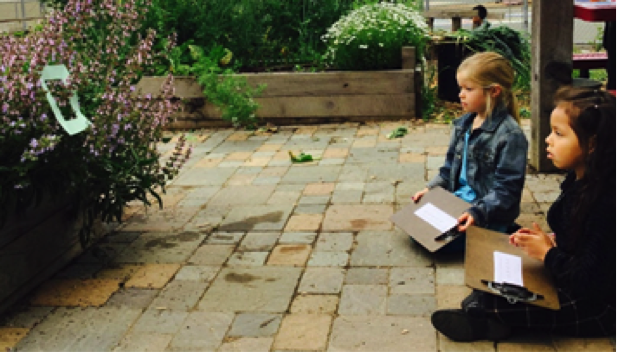 As someone who’s always maintained a
fondness for campy antics, not to mention built a strong personal
identity as an environmental educator, two of my favorite tag
lines are, ‘The more you look, the more you see!’ and
‘Change is the only constant!’ I’ve used these
phrases way too many times with students and throughout my life
in general; yet here I am, revisiting their meanings once
again. These simple themes help formulate my thinking about
the ethos of citizen science.
As someone who’s always maintained a
fondness for campy antics, not to mention built a strong personal
identity as an environmental educator, two of my favorite tag
lines are, ‘The more you look, the more you see!’ and
‘Change is the only constant!’ I’ve used these
phrases way too many times with students and throughout my life
in general; yet here I am, revisiting their meanings once
again. These simple themes help formulate my thinking about
the ethos of citizen science.
How Can Universities Support Citizen Science?
At the Citizen Science Association Conference in St. Paul, MN, we used the poster session as an opportunity to discuss the role of universities in this rapidly developing field. You can check out our poster, which outlines some of our ideas, and then have a look at #citisciuniversities, to see some of what we heard.
Where to find us at CSA
This week, the Citizen Science Association (CSA) convenes in St. Paul, Minnesota for its biennial conference, bringing together diverse and interdisciplinary groups of researchers, practitioners, community organizations, and participants from across the field. The Center for Community & Citizen Science (CCS) will be showcasing work from a number of our recent and ongoing projects. If you are attending the conference, we encourage you to check out what we’re sharing!
Sharing Community & Citizen Science with Local Educators
In February, we teamed up with Pepperwood Preserve and Sonoma County K-5th grade educators to run a workshop on how to facilitate community and citizen science in the classroom. Activities included observational sketching, a mini bioblitz, and sharing the YCCS Environmental Science Agency framework. Educators left eager and equip to try out new projects in creative ways with their students.
YCCS Team Produces First Research Brief
The YCCS team is proud to present it’s first research brief. YCCS (Youth-focused Citizen and Community Science) has been a focus for the center for the past few years, and the research brief is the product of a multi-year study on YCCS.
Evolving Ethics within Citizen Science
As citizen science continues to grow and evolve, questions posed by researchers across many areas of study have emerged alongside this dynamic, new field.
Here at UC Davis, explorations in community and citizen science are taking place among several groups on campus. Most recently, the Department of Science & Technology Studies hosted Professor Shun-Ling Chen from Academia Sinica in Taiwan, who gave a lecture on her work investigating questions of ethics and fairness for those who participate in crowdsourced citizen science projects.
Poster on Best Practices for Engaging Communities in Citizen Science
Graduate student Jen Metes recently presented early insights from her work on the COASST project in a poster at the National Association of Environmental Education (NAAEE).





